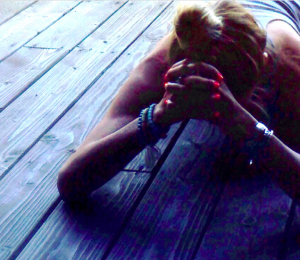Committing to doing what’s best for us is not always easy, especially when the hearts of others may get bruised, and their expectations may go unmet.
If you were to tense up every muscle in your body––your feet, your calves, your face, your teeth––that’s sort of the way it feels during the time leading up to doing what’s best for you, at least until you’ve had some practice. You feel like a big tight fist.
But once the words of truth find their way through parted lips, the tension loosens, the grip is undone, and you feel almost euphoric. It’s liberating in a way, even though it can feel awkward, and sometimes painful as you transition through the process. For those of us who are caretakers (most of us), it’s especially difficult to speak up for what’s truly in our best interest. It can be challenging to strike graceful balance between establishing healthy boundaries, and honoring those we share our lives with.
Most of my life, I’ve was a devout, hardcore emotional caretaker––a quality that lives in they grey. The caretaker believes self-sacrifice, generosity, and a willingness to put other’s needs first originates from a place of pure intent.
Certainly there is a great deal of truth to this. Caretakers genuinely do want to help. They want to support. They want to give, and want to see others happy, well, and succeed in life.
On the flip side of this pure intention is often a bit of subconscious self-service. These tender loving caretakers often have unmet needs that get temporarily fulfilled by doing good for someone else. These needs might be to feel loved, to feel appreciated, or to feel they are of value. There is a fine line between the caretaker’s actions being genuine, and being self-serving. Unfortunately, the caretaker is often unaware of these under the surface motivations.
I lived the caretaker’s way for most of my life. By being there, doing for, and giving to others, a deep sense of intimacy was established. I felt connected, needed, wanted, and valued. For as long as I can remember, I got high from seeing others around me being built up. I experienced a sense of satisfaction knowing I played a part in their lives being made better. It felt good, really good, until one day, it didn’t feel good anymore––at least not at times when my doing for others diminished my emotional and physical wellbeing.
Without going into the whole story of how I came to this place, I’ll say that it was a pinnacle moment in my journey. I learned that by loving me, and establishing boundaries that honor my needs, I am even more capable of truly loving and caring for others––authentically, whole-heartedly, and without condition.
The first time I really tried out the act of conscious and graceful truth telling was during a routine pedicure. I had, for years, seen the same practitioner because she was persnickety about her polishing––something I tend to fuss over too. What she didn’t do to my level of satisfaction was massage my feet with the depth of pressure I enjoy. Her hands more or less brushed the bottoms of my feet, causing me to squirm from being tickled rather than rubbed. This went on every two weeks for five years.
For half a decade, I paid for a superior polish, but received what I considered to be a non-existant massage. Every time I walked out that door, I was happy on the one hand for perfectly polished toes, yet deeply frustrated and annoyed on the other. I never wanted to say anything to her, because I was afraid I’d hurt her feelings. Meanwhile, my silence was hurting mine.
When I began to awaken to the importance of speaking my truth, I tested it out. I gracefully and kindly said, Tracy, could you please use a little deeper pressure? Without a moment of pause, she responded cheerfully, Oh, of course. And for the next three years, getting my pedicure was actually the blissful experience it is meant to be.
I realize this is a small example, but the underlying principle is the same. When we say what is true for us, we enroll others in the life we want to live. Sometimes, the others don’t want to come along, and that’s okay. It may feel lonely for a while, but with more practice of being true to you, you’ll eventually begin to only attract those into our experience who share your truth. You won’t have to struggle so much interacting with those who don’t.












